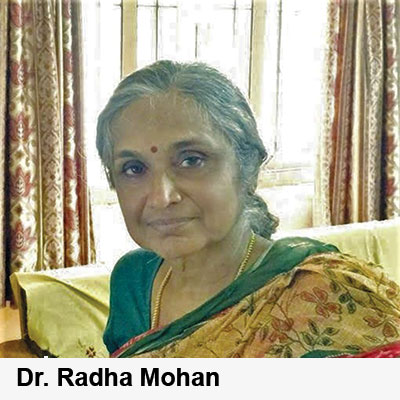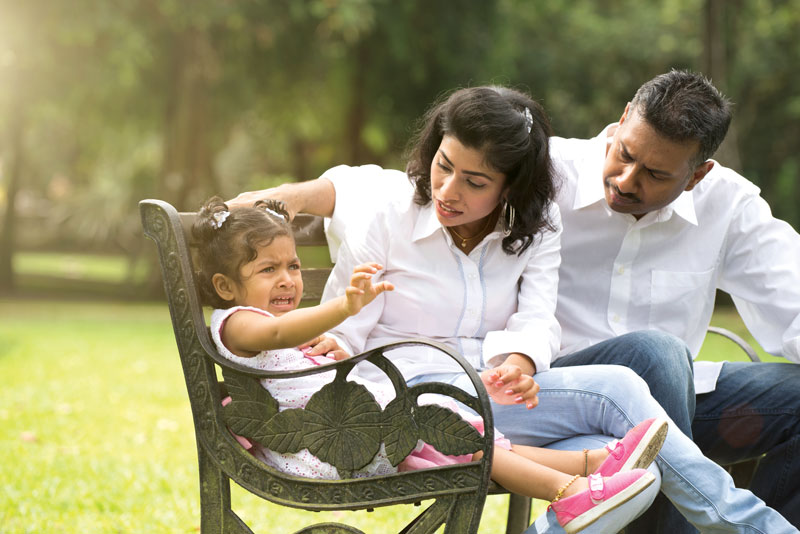Social danger. Don’t raise spoilt brats!
In post-liberalisation India and the new millennium in particular, with newly affluent and indulgent parents giving in to their children’s every whim and demand, there is rising awareness that we are raising a generation of self-centred, narcissistic children with an overweening sense of entitlement
– Jayalakshmi Vaidyanathan & Mini P

On August 9, a Haryana youth drove a brand new BMW motor car into a canal near Yamunanagar in a fit of rage because his father presented him a BMW (price tag: Rs.45 lakh) when he had set his heart on a Land Rover Jaguar (Rs.1.1 crore). The young man wanted his landowner father to know how upset he was over the trivial birthday gift. So he recorded a video of his protest and posted it on social media.
Though this example of a spoilt rich brat throwing a tantrum when he didn’t get his own way is over the top, in urban newly affluent households — and even rural India — there is growing disquiet about I-me-myself children and youth of the 21st century. With the country’s small but growing newly affluent class parents conceding every whim and demand of their children, there’s rising awareness that a generation of self-centred, narcissistic children with an overweening sense of entitlement is running amok countrywide. As nuclear households with working parents become normative in urban India, the dynamics of parent-child relationships are changing radically. Within the country’s newly rich haute bourgeoisie it has suddenly become politically incorrect to discipline children and deny them instant gratification. ‘My children right or wrong’ is becoming a normative sentiment and the newly emergent selfie and Instagram generation is taking full advantage of permissive parenting.
 “Millennial parents want to give their children the best — materially and emotionally. But in their yearning to become ideal parents, they are over-protecting and over-indulging children. However it’s time parents become aware that parenting is not a popularity contest; it’s about raising well-balanced children while providing love, comfort and emotional security. Couples who mollycoddle and over-indulge their children are in effect encouraging them to transform into narcissistic and self-centred spoilt brats incapable of accepting denial and refusal. Learning begins at home and the onus is on parents and caregivers to develop positive social skills such as sharing, caring, empathy and respect for rules and authority in children. Parenting is a responsible duty,” says Vyshakha Chikkanagoudar, psychologist at the Asara Centre for Psychological Wellness, Bangalore.
“Millennial parents want to give their children the best — materially and emotionally. But in their yearning to become ideal parents, they are over-protecting and over-indulging children. However it’s time parents become aware that parenting is not a popularity contest; it’s about raising well-balanced children while providing love, comfort and emotional security. Couples who mollycoddle and over-indulge their children are in effect encouraging them to transform into narcissistic and self-centred spoilt brats incapable of accepting denial and refusal. Learning begins at home and the onus is on parents and caregivers to develop positive social skills such as sharing, caring, empathy and respect for rules and authority in children. Parenting is a responsible duty,” says Vyshakha Chikkanagoudar, psychologist at the Asara Centre for Psychological Wellness, Bangalore.
This phenomenon of over-indulged spoilt brats with money to burn is not peculiarly Indian. Around the world, over-indulgent parenting — particularly in newly emergent less developed countries — by the nouveau riche (especially in the political class) has resulted in spoilt brats running amok and setting bad examples for impressionable children to follow.
A 2015 study of 565 children aged seven-12 and their families conducted in the Netherlands, concluded that narcissism is more likely to manifest when a child is “overvalued” by parents during her development stages. The objective of the study, jointly conducted by Ohio State, Amsterdam and Utrecht universities, was to trace the “origins of narcissism” — a phrase derived from Greek mythology, which recounts the story of Narcissus who fell in love with his own image reflected in a pool of water — defined as “personality qualities including thinking very highly of oneself, believing others are inferior and lacking empathy for others”.
The study revealed that children whose parents described them as “more special than other children” and as kids who “deserve something extra in life” scored higher in tests of narcissism than peers not similarly eulogised. “Children believe it when their parents tell them that they are more special than others. That may not be good for them or for society. Parental warmth and encouragement may be a better strategy than inflating the ego. It is important to express warmth to your children because that may promote self-esteem, but overvaluing them may promote higher narcissism,” says Brad Bushman, professor of communication and psychology at Ohio State University. According to the researchers, narcissistic children have difficulty in sustaining personal relationships, lack empathy and tend to become hypersensitive and ungrateful bullies.
 Dr. Radha Mohan, former principal of Rajalakshmi College of Education, Thandalam, Chennai who has over four decades of experience working with children and parents, and currently advisor to the Chinmaya Mission Education Cell, believes that 21st century children are becoming increasingly self-absorbed and narcissistic. “Growing narcissism in today’s children and youth is manifested by their obsession with grooming and good looks, overwhelming desire to possess latest digital gadgets, constant comparison with peers, inability to form stable relationships, lack of empathy in daily interactions and low tolerance of disappointment. Parents and teachers need to emerge as role models with value-based education stressed at every level of schooling. Parents must learn to not give in to children’s unreasonable demands and prepare them to cope with disappointment and frustration. Most important, they need to tell their children firmly but kindly, that social equality is a virtue that needs to be practised,” says Mohan.
Dr. Radha Mohan, former principal of Rajalakshmi College of Education, Thandalam, Chennai who has over four decades of experience working with children and parents, and currently advisor to the Chinmaya Mission Education Cell, believes that 21st century children are becoming increasingly self-absorbed and narcissistic. “Growing narcissism in today’s children and youth is manifested by their obsession with grooming and good looks, overwhelming desire to possess latest digital gadgets, constant comparison with peers, inability to form stable relationships, lack of empathy in daily interactions and low tolerance of disappointment. Parents and teachers need to emerge as role models with value-based education stressed at every level of schooling. Parents must learn to not give in to children’s unreasonable demands and prepare them to cope with disappointment and frustration. Most important, they need to tell their children firmly but kindly, that social equality is a virtue that needs to be practised,” says Mohan.
In the new age of the Internet and social media in which demands for food, hotels, holiday-bookings and cab-rides are quickly gratified and self-expression media are available 24×7, children and youth are fast losing the virtues of patience and the character-building advantages of delayed gratification.
“Today’s generation is growing up in a world of gadgets with apps that reward them with instant gratification. I believe it’s important for parents to strike a balance between traditional and modern parenting. They should monitor their children’s exposure to technology and try to provide them a childhood that involves daily physical activity and play with peers. This type of childcare will help them develop the values of empathy, sharing, collaboration and team work. The duty of parents is not to shield and protect children from all adversity, but to prepare them to face life’s challenges,” says Manjula Sachin, principal of the CBSE-affiliated Rangoli International School, Gandhinagar, Gujarat.
In short, latter day parenting requires assumption rather than abdication of the traditional responsibilities of raising well-balanced, emotionally stable and socially responsible children, not narcissistic spoilt brats whose number is multiplying at an alarming rate.

10 signs that your child is a spoilt brat
Here are 10 signs that your child may be over-indulged:
• Does she always get her way within her peer group?
• Does she throw frequent temper tantrums?
• Is she unhelpful?
• Does she rarely express thanks and gratitude?
• Is she reluctant to share her possessions with other children?
• Does she speak to you like she does to her friends?
• Is she a bad loser?
• Does she constantly complain?
• Does she always want to be the centre of attention?
• Is she defiant of authority?
If your answer is yes to most of these questions, your child is over-indulged and spoilt.
Correcting over-indulged children
Children are constantly learning and evolving, and it’s the duty of parents to help them break out of bad habits, and develop better attitudes and behaviour. Here are some corrective behaviour pointers:
Don’t apologise for disappointments. Don’t express regret for not being able to buy your child the most expensive headphones in the market. Apologise sparingly. For instance if you cannot take your children to the park because of work pressure, resist the temptation to over-compensate them by way of gifts and treats. Explain that you need to work for the family’s well-being and security. Children should learn from youngest ages that they can’t have everything they fancy.
Manage temper tantrums. No parent likes a tantrum, but children will continue throwing them if they realise tantrums help them to get their way. Therefore, don’t give in to tantrums, and learn to ignore them. When children realise a parent cannot be manipulated by their making a scene, tantrums will taper off.
Practice makes perfect. It will feel strange the first time you refuse to comply with your child’s demand. But with the passage of time, children learn to accept parental judgement. When you stand firm, you earn their respect and assert your parental authority.
Teach your children that they must earn what they want. A new phone, headphones, whatever it is that your child wants, teach them to earn it. Babysitting, putting away the dishes after dinner, making their beds, walking the dog, are some of the ways in which children can earn rewards and assume responsibility. When children earn things for themselves, they value them more.
Involve your child in community service. When children begin to do things for others, they automatically learn compassion and selflessness. Enrol your child as an NGO volunteer or with a local community project.
Role model good behaviour. Children learn and develop most of their attitudes in the formative years by observing and studying the parents and elders. Parents must practice self-restraint and the disciplines they want their children to emulate.
















Add comment